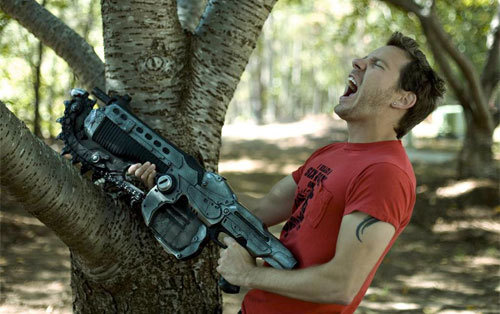This post has not been edited by the GamesBeat staff. Opinions by GamesBeat community writers do not necessarily reflect those of the staff.
Female gamers have been, and still are a relatively rare breed. The genres of the games we play today are clearly tailored to male gamers, and have only served to discourage potential female ones.
On this week's episode of Weekend Confirmed, Garnett Lee brought up Leigh Alexander's recent article, http://www.gamasutra.com/view/news/29719/InDepth_No_Female_Heroes_At_Activision.php. During the discussion, I noticed a slight tinge of frustration among the cast, as Jeff Canata made this clear by asking Garnett if Leigh Alexander's sentiments were feminist. I perceived this as an interesting dynamic among video game fans, both male and female. First, you have male fans, who whether rightly or not, generally claim video games as a form of "escapism" for themselves. This "escapism" may be from work, a hectic family life, or God forbid, a nagging girlfriend or wife. This is admittedly rather immature, for this sort of exclusive "boys-only" club mentality is evident.

Then there is the comparatively small quotient of female gamers. Some of these brave women wear their pride on their sleeves when delving into the ranked matches of the video gaming world, indicating their feminity at every possible avenue, be it through pink armor in Halo 3, or a feminine Gamertag, Gamerpic or Bio. Such gamers are usually the butts of constant jokes shared in video game lobbies throughout the world, which is why most female gamers, or so it seems, feel inclined to not indicate a gender in order to avoid ridicule.
What I can't take though, in attempting to provide a fully unbiased and fair viewpoint is both the immaturity stemming from male and female gamers alike (or should I say female gamers first, because I know that offended you six female readers out there). As that parenthetical would indicate, female gamers constantly feel they're getting the short end of the stick, and in my opinion, generally complain too much in attempting to compensate for their disadvantaged position. I also sense there is a disconnect between female and male gamers, which is why sometimes such thick borders separate the two.
Such a dynamic [and hear me out on this one] is comparable to when settlers from a given nation take refuge to another for work, safety, or religious freedom. You have the Sicilians that immigrated to Italy in the 20th Century, and is still in fact going on today, you had the mass exodus of Italians to the United States in the 1920s, the German refugees that went to South America soon after, if not, during World War II, in 1947, or thereabouts, there were hundreds of thousands of Palestinian refugees that headed for Israel, and many other rich examples. Said ethnic groups all formed communities and ghettoes in order to live without discrimation. And to make this all come full-circle, without exhausting you with any more history, female gamer communities such as the PMS gaming clan have more or less sought refuge from the intolerable hoards of largely pig-headed, insensitive and downright rude male gamers that have in no way encouraged them to continue playing games. Yet one of the few, necessary caveats between female gamer communities, and a given ethnic ghetto in 1920s New York City, is that where Italians, Germans, and Polish-American citizens willfully naturalized into the American populace, female gamers revel in their bright pink armor and weird mix of sexy and deadly game monikers. It's only a few female gamers that willfully assimilate amongst the male demographic for pure love of the treacherous, volatile and unrelenting nature of it. (And don't ask me why any sensible female gamer would!)

Conversely, male gamers have a sense of pride when it comes to playing video games. Most have done it for much of their lives, and when a girl hops on their team in any given meat-headed, space-marined first-person shooter, they soon become furious should their team lose. Said gamer will then assume that all female gamers lack skill as a result of one poor player and become overly competitive when playing against female gamers, using tea-bagging as a tactical deterrent should any female gamer get in the "way" of his killstreak.
Now on to the matter at hand. In her article, Leigh Alexander took issue with the lack of female protagonists
Think of it this way; sexism isn't actually at play here, is it? These are mere theoretical concepts, like male and female, applied to millions of polygons that we see as a character model that resembles a girl or a boy. This is not nearly as serious an issue whether or not the general public would be in favor of a woman as President or if the military draft were applied to females, but rather, a semantic argument that lacks much of any rhyme or reason and is being posed for the pride of womanhood that Alexander clearly holds so dear. It truly isn't sexist or discriminatory of Activision to pull a project with a female protagonist. But such an action invites its fair share of many potentially misconstrued and twisted implications. In short, Activision felt a franchise with a female lead wouldn't sell.

Might I add, with someone as Bobby Kotick running the joint, would you expect anything less as pig-headed and ignorant? Here’s an admittedly exaggerated paraphrase that epitomizes Activision’s managerial staff’s reluctance; “Hey, GTA IV sold 10 million copies, so that's what we expect from you.” Kotick has specifically gone on the record for saying that he only cares to support IPs that "have the potential to be exploited every year on every platform with clear sequel potential and have the potential to become $100 million franchises."
While I believe Leigh Alexander's sentiments are wrongly placed, I believe the fault is on Activision for pulling a title with promise, such as "Black Lotus" in an industry where titles such as Mirror's Edge, Final Fantasy XIII and Metroid: Other M (all of which have female protagonists) have all been [or will be] met by relative success.
At the same time, playing devil’s advocate, I am led to believe that the majority of gamers, who are in fact male, and who strongly influence the [hardcore, rather than minigame] gaming industry, fantasize about themselves living out the senseless acts of murder and horror they orchestrate in the games they play. Of course, games where acts of crime and sabotage are possible, such as the Grand Theft Auto, Just Cause, or Crackdown series, it is most peoples’ expectations for male characters to be responsible for such high and imaginative levels of crime. Which, or so it seems, is the precise reason why so many female protagonists are cast as assassins, rather than rampaging menaces and renegades. I argue that should the largely male percentage of gamers playing any given game witness a slender woman throwing cars and firing rocket launchers, much like the common activities of a character in the Crackdown 2 universe, they would say it looks silly. But if that female character model were buffed up some, in order to make the experience that much more plausible for the player, most male gamers would in fact be disgusted with the appearance of a female body-builder, and therefore refuse to play such a game.
Yes, I concede that the list of successful games with powerful and non-oversexualized female protagonists, with rich stories is scant. And yes, I agree that the market for games is immature for having such a rigid criteria for the games it’s willing to play: meatheads, bros, lots of weapons and explosives, cursing, aliens, Russians, Nazis, Chinese, Koreans, South Americans, Mexicans, buckets of blood, gore, regenerating health, assault rifles, pistols, rocket launchers, shotguns, sniper rifles, bullets, grenades, and a disposable story. The world of gaming has imperceivably changed since the days of Doom and Quake so long ago, as to feel obligated to reincarnate the same level of intensity, gore, gruesomeness and gratuitousness, and “manliness” in a number of slightly different looking skins that provide a similar enough feedback of power, control, and strength to the player. It truly is no wonder why the online servers of the gaming world today is so filled with jerks, sexists, racists, and discriminants of all kinds; it’s considered a rite of passage.

It seems articles like these you-cant-be-a-girl-in-crackdown-2/ are serving to chip away the devoutly male-centric themes and customization options we’re finding in games today. Truth be told, I’m sick and tired of the Abbie Heppes and Raychul Moores of the gaming press and fanbase, the few and far between “gamergirl” types that are actually competent players, and feel inclined to hint at that fact, in both subtle and explicit ways, as often as humanly possible. What I want is no such divisions, I don’t want “gamergirl” emails to be read over a male gamer’s on gaming podcasts, I don’t want people to feel the need to specify what gender he or she is. I don't want special attention to be drawn to "gamergirls" over male gamers.

The issue is very much akin to race. In what instance is it, while playing an online competitive, or cooperative game that one finds it necessary to indicate what his or her ancestry, ethnic origin, or birthplace is? It is simply irrelevant to the gaming experience. The day that we as gamers see each other merely as “gamers”, rather than “female”, or “African American” gamers, and stop making such unnecessary discriminations that only serve to harm and insult, rather than to include and accept, will be the day the gaming industry is fully united. Until that day comes, we sadly remain discriminant in our Xbox Live friend-choosing and rigid in our game choosing.
Now finally, to address the title of this very article, "Female Gamers too Sensitive, Male Gamers too Insensitive". As I mentioned earlier in this piece, gaming has been home to countless male childhood memories, and for that, it is near the hearts of many a male gamer today. The issue most prevalent today, it seems, is the simple, yet wildly complex concept of "sharing". You've no doubt been taught "sharing" by your mother, father, guardian, or relative at an early age. But what's so fascinating is that most gamers still can't fully grasp such a shallow concept. There's currently a rather sizable number of female gamers getting into the hobby at the moment, and also, as I previously mentioned, they've only been met by a palpable resistance, or the "boys-only" club mentality. As the newcomer female gamers are willing to embrace, learn, grow, and appreciate, they are met by many male gamers who have sought to sabotage the experiences of such female gamers (and yes, of course there ARE exceptions), and make their playing a living hell through ridicule and various other tactical deterrents. So in wrapping this arguably long-winded piece, full of grand postulating and gesturing, I acknowledge both the accommodating male gamers, and the grateful female gamers out there, and appreciate your contributions to the world-wide gaming community, so keep it up, and include, and involve as many people from as many different groups as possible.

